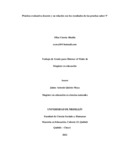Práctica evaluativa docente y su relación con los resultados de las pruebas saber 9°
Compartir este ítem
Autor
Cuesta Abadía, Elías
Citación
Metadatos
Mostrar el registro completo del ítemDocumentos PDF
Resumen
La presente investigación tuvo como propósito general analizar la relación entre la práctica evaluativa de la docente del grado 9° en el área de Lenguaje y los desempeños obtenidos por los estudiantes en la Prueba Saber. A nivel teórico, se desarrolló una visión general de la evaluación, iniciando por la definición, tipos y aplicaciones desde el territorio, la pedagogía y la diversidad. En cuanto a la metodología se inscribe en un paradigma sociocrítico, con enfoque de investigación cualitativo, enmarcada en una investigación de tipo descriptiva a través de un estudio de caso único, que permitió hacer una identificación, descripción, interpretación y análisis de las prácticas evaluativas de la docente en el aula, pues posee las condiciones necesarias para analizar una situación determinada. La población estuvo conformada por 8 docentes de la IER San Antonio de Padua, distribuidos en diferentes áreas y asignaturas. Del grupo de los 8 docentes se seleccionó una muestra representativa de una docente que tiene a su cargo el área de Lenguaje. Como técnicas de recolección de información se utilizó el análisis documental, la observación participante y la entrevista semiestructurada y como instrumentos de recolección de información se utilizó el fichero o ficha documental y el diario de campo. Estos instrumentos permitieron evidenciar cada una de las etapas del proceso de investigación. En conclusión, en la IE, la evaluación en el área de Lenguaje es utilizada para medir el desempeño de los estudiantes y se hace de manera variada, aunque no se desarrolla por competencias. Además, los resultados de la evaluación o de los instrumentos aplicados en el aula son medidores de aprendizaje, pero no se hace evidente una retroalimentación eficiente ni para los estudiantes ni para IE. The general purpose of this research was to analyze the relationship between the evaluative practices of the 9th grade teacher in the area of Language at the San Antonio de Padua Rural Educational Institution in the municipality of Vigía del Fuerte, Antioquia, Colombia, and the performance obtained by the students in the Saber Test. At a theoretical level, a general vision of evaluation was developed, starting with the definition, types and applications from the territory, pedagogy and diversity. As for the methodology, it is inscribed in a socio-critical paradigm, with a qualitative research approach, framed in a descriptive type of research through a single case study, which allowed the identification, description, interpretation and analysis of the evaluative practices of the teacher in the classroom, since it has the necessary conditions to analyze a given situation. The population consisted of 8 teachers of the IER San Antonio de Padua, distributed in different areas and subjects. From the group of 8 teachers, a representative sample of a teacher in charge of the Language area was selected. Documentary analysis, participant observation and semi-structured interview were used as data collection techniques, and the file or documentary record and the field diary were used as data collection instruments. These instruments made it possible to demonstrate each of the stages of the research process. In conclusion, in the IE, the evaluation in the area of Language is used to measure the students' performance and it is done in a varied manner, although it is not developed by competencies. In addition, the results of the evaluation or of the instruments applied in the classroom are measures of learning, but no efficient feedback is evident either for the students or for IE.
Colecciones
- Tesis [686]


